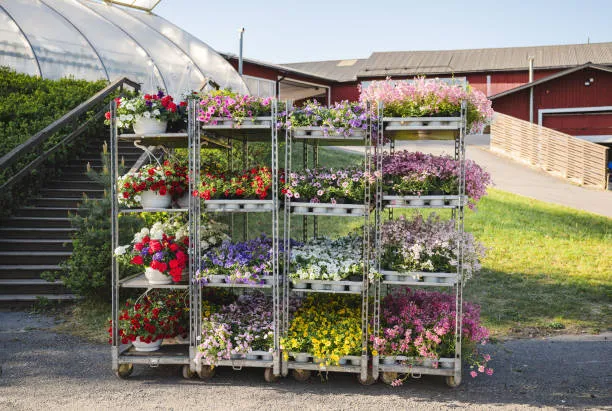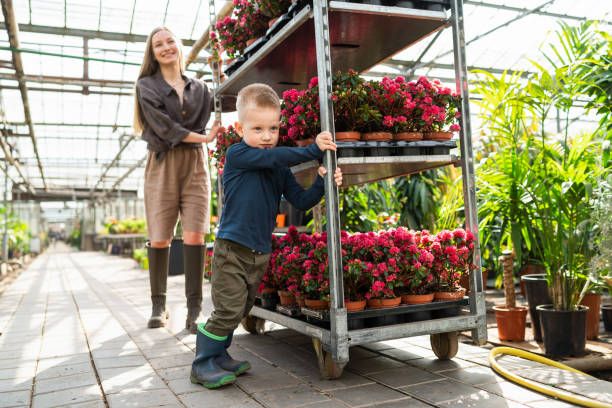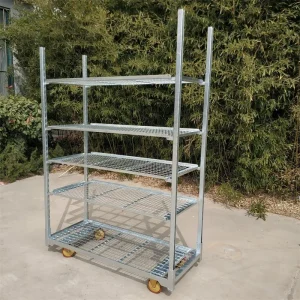Avoid your inquiry is delay response, please enter your WhatsApp/Skype along with the message, so we can contact you at the very first time.
We will reply you within 24 hours. If for urgent case, please add WhatsApp/WeChat: +8613791936882 ,. Or call +86-18678911083 directly.
Transporting flowers sounds simple, but without the right tools, it’s easy to lose time, money, and product quality.
The best wholesale gardening equipment is durable, flexible, and designed to move flowers safely from factory to store to garden.

I work with garden retailers, wholesalers, and nursery managers like Sophia every week. Their biggest concern? Finding equipment they can count on—especially during peak seasons. In this post, I’ll break down the best ways to transport flowers, the real advantages of using trolleys, and how material choices affect trolley performance.
Broken stems and wilted petals usually mean the transport system failed somewhere.
Most flower professionals use Danish trolleys, nursery carts, and rolling racks to move plants quickly and safely.

Transporting flowers requires more than just putting them in boxes. Flowers need air circulation, support, and fast movement. That’s why commercial flower handlers rely on structured transport systems.
These trolleys are designed specifically for the flower and plant industry. They feature steel frames, multiple adjustable trays, and smooth wheels. They allow florists to load flowers once at the factory and unload directly into the store or greenhouse—no need for extra handling.
| Feature | Purpose |
|---|---|
| Adjustable shelves | Fits all plant sizes |
| Standard Euro-size | Easy truck loading |
| Galvanized steel | Long-lasting durability |
| Swivel wheels | Easy movement |
These are used mostly inside growing areas. They can carry heavier loads but are not stackable or ideal for truck transport. They’re often wider, which limits how many you can fit in one shipment.
These are still used in smaller operations or for very short trips. However, they are not efficient for large-scale operations. They don’t protect the plants well and can cause delays during loading and unloading.
If you want to scale your operation or improve speed, Danish trolleys are by far the most effective option. They’re made for this purpose and can cut transport time in half.
Unloading flowers by hand takes time and causes damage. That adds to your cost every day.
Trolleys make flower transport faster, safer, and easier—improving your workflow and reducing loss.
Years ago, one of our clients in the UK switched from plastic trays to Danish trolleys1 across all five garden centers. She later told me that this was the one upgrade that made the biggest difference. Her team could unload full shipments in 15 minutes instead of an hour.
Trolleys are built with high-quality wheels2. One person can move a loaded unit through tight shop aisles or between greenhouse rows. That saves labor and avoids delays.
When you handle flowers less, you protect them more. A trolley keeps them upright and separated during every part of the journey—from truck to shelf.
You can move trolleys straight into a retail display area. That reduces the need to transfer flowers from crate to shelf. Less work means faster restocking, especially helpful during seasonal rush.
Yes, trolleys cost more upfront. But they last for years. You avoid spending over and over on breakable crates or cheap carts. And your flower waste goes down.
| Benefit | Why It Matters |
|---|---|
| Saves Time | Quicker loading and display |
| Cuts Labor | One person can do more |
| Protects Inventory | Less waste from broken flowers |
| Reusable | Durable for years |
| Better Display | Move directly to sales floor |
Whether you’re managing five shops or one big greenhouse, a trolley simplifies your process and keeps your flowers in top shape.
A trolley is only as strong as the material it’s made of. Weak materials lead to broken frames, rust, and wasted money.
The best flower nursery trolleys are made of galvanized steel because it’s strong, rust-resistant, and built to last.

I’ve tested many materials over the years—aluminum, coated iron, plastic, and galvanized steel. While each has its place, only one material consistently delivers the strength and durability needed in professional gardening environments.
This is the most popular material for commercial trolleys. It’s steel coated with a layer of zinc. The zinc protects the trolley from rust, even in wet greenhouse environments. Galvanized steel trolleys can handle heavy loads and last for years without maintenance.
| Material | Pros | Cons |
|---|---|---|
| Galvanized Steel | Strong, weatherproof, long-lasting | Heavier than aluminum |
| Aluminum | Lightweight, rust-free | Less durable, bends under heavy loads |
| Painted Iron | Cheap | Paint peels, rusts fast |
| Plastic | Lightweight, no rust | Breaks easily, can’t carry much |
Some clients ask for aluminum trolleys because they want something easier to lift. That makes sense for smaller shops. But I don’t recommend them for large-scale use. Aluminum bends under pressure, especially during transport.
Plastic looks good when new. But once loaded with pots or heavy plants, the shelves crack. Painted iron is cheap but rusts quickly. I only recommend these if you’re doing light-duty work indoors.
For wholesale operations or large gardens, galvanized steel offers the best mix of strength and low maintenance. That’s why we build all our Danish trolleys with it. You’ll get a longer life, better reliability, and fewer headaches.
Good gardening equipment saves time, protects your products, and lasts longer. That’s why flower trolleys made of galvanized steel are the top choice for serious professionals.
Explore how Danish trolleys can enhance efficiency and reduce flower damage in garden centers, making them a smart investment. ↩
Discover the importance of high-quality wheels in trolleys for smoother movement and reduced labor costs in retail environments. ↩
Explore the advantages of Galvanized Steel, the industry standard for durability and strength in gardening trolleys, ensuring long-lasting performance. ↩